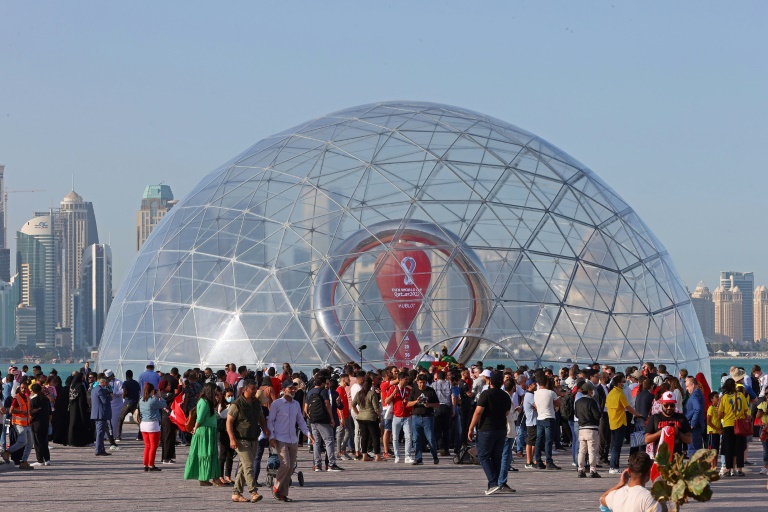Qatar faces World Cup questions as 200-day countdown looms

The World Cup clock in Doha will start counting down 200 days to kick-off for the first finals to be hosted in an Arab country on Thursday but hosts Qatar face questions over costs and conditions for fans
Doha – Migrant labourers are working through the night near the World Cup clock that will start counting down 200 days to kick-off on Thursday, with hosts Qatar facing mounting questions over costs and conditions for fans.
Eight shiny, air-conditioned stadiums are ready for the tournament’s start on November 21, but every night the army of South Asian workers who underpin Qatar’s energy-rich economy swarm over unfinished roads and building sites around Doha.
Dozens of gigantic cranes tower over the capital’s skyscrapers while organisers juggle with the dilemma of welcoming an estimated 1.4 million fans wanting entertainment and alcohol in the tiny, conservative Islamic state.
FIFA president Gianni Infantino has promised the “best ever” World Cup and a FIFA spokesperson told AFP that the global body had been “impressed” by Qatar’s infrastructure programme.
But many fans worry about the cost of travel and accommodation for the Qatar World Cup, the first in an Arab country.
Qatar has faced frequent questions about human rights, including for the tens thousands of migrant workers who built infrastructure around the World Cup. Qatar says it has cracked down on abusive practises and introduced reforms, including a minimum wage.
But Ronan Evain, head of Football Supporters Europe, a lobbying group, said transport and beds were fans’ main concerns.
“This is the most complicated World Cup of the modern era for logistics,” he told AFP. “Fans see prices rising and don’t know when it will stop.”
As prices soar post-Covid, Madrid-Doha return air tickets in November have already reached more than $1,680, almost three times the cost in 2021.
Many fans still do not know if they have match tickets — which are a third more expensive on average than for 2018 — and they cannot book accommodation on the official website without a seat number.
Qatar says there will be 130,000 rooms in hotels, apartments, cruise ships and desert camps. It has promised shared rooms for as little as $85 a night.
– ‘Getting information is a nightmare’ –
Ambassadors from many of the 32 competing nations have told AFP of their concerns over the lack of information about issues ranging from alcohol to the treatment of gays in Qatar, where homosexuality is illegal and alcohol is restricted to mainly foreign non-Muslims.
“There is no problem with the concrete and steel,” said one ambassador, speaking on condition of anonymity. “But they are not telling us enough about how it will all be policed. There are meetings but no detail.”
“Getting information from the organising committee is a nightmare,” said Fabien Bonnel, a spokesperson for Irresistibles Francais, the biggest French supporters association. He predicted fewer French fans than previous tournaments.
Before other World Cups the talk was often about stadiums not being ready but 2022 is different, said Danyel Reiche, a professor at Georgetown University Qatar and author of “Qatar and the 2022 FIFA World Cup. Politics, Controversy, Change”.
“There are many indicators that this will be an excellent World Cup,” said Reiche.
“The challenge here is to meet the needs of Western fans who are used to consuming alcohol whilst watching matches whilst respecting local culture.
“Pragmatic compromises need to be found to respect both sides.”
FIFA and the Qatar organisers, the Supreme Committee for Delivery and Legacy, have sought to reassure fans about accommodation, rights and drinking.
Alcohol is likely to be sold at fan zones and special areas near stadiums at a subsidised price of about $6.25 a beer, as it was during the 2019 Club World Cup and last year’s Formula One race in Qatar, organising sources said.
“Many countries have restrictions on the public consumption of alcohol. Qatar is no different and simply asks fans to respect the country’s conservative culture,” said a Supreme Committee spokesperson.
Drunkenness will be handled “in a sensible and sensitive manner”.
FIFA said it had stressed its “unequivocal” stand on human and gay rights to Qatar.
FIFA had insisted that law enforcement around the World Cup be “non-discriminatory, and strictly necessary and proportionate” including allowing lesbian-gay-transgender symbols and colours inside and outside stadiums, said the spokesperson.
“Rainbow and other sexual identity colours on flags are allowed at any FIFA competition and have been displayed at previous FIFA tournaments in Qatar.
“FIFA is confident that all necessary measures will be in place for LGBTIQ+ fans and allies to enjoy the tournament in a welcoming and safe environment, just as everyone else.”
